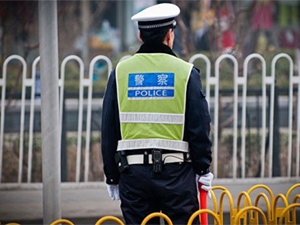



Date:07/02/18
 With a network of more than a 170 million surveillance cameras in the country which is expected to grow more than three-fold with 400 million more set to be installed by 2020, China has been building what it calls "the world's biggest camera surveillance network". In a move to expand its security network to the ground level, police staff deployed at Zhengzhou Railway Station will now use smart glasses to identify, screen out and eventually catch criminals at the station premises.
With a network of more than a 170 million surveillance cameras in the country which is expected to grow more than three-fold with 400 million more set to be installed by 2020, China has been building what it calls "the world's biggest camera surveillance network". In a move to expand its security network to the ground level, police staff deployed at Zhengzhou Railway Station will now use smart glasses to identify, screen out and eventually catch criminals at the station premises.
According to a report by Chinese publication Shixunwang, the move is a part of the 2018 Spring Security Campaign. Police personnel have already started using these smart glasses to identify criminals who were trying to leave the city through the rail network or were involved in cases of faking identities. Zhengzhou Railway Police claims to have made seven arrests in cases involving human trafficking and traffic accidents apart from 26 others who had faked their identities.
This is not the first the time that China has put technology to use when it comes to making public transport safer. Recently, robot security guards were deployed at the Zhengzhou station itself that could identify criminals, monitor the station’s air quality and temperature and even rigger fire or security alarms if it detects any danger.
The increasing use of technology in making the country safer stems from the recent launch of Anbot, world's first armed police robot which is deployed at the Shenzhen Bao'an International Airport for a 24-hour patrol duty.
To get just a basic idea of how strong China's surveillance system has become, BBC had recently sent journalist John Sudworth to Guiyang, a southern city with a population of about 3.5 million people. The basic aim was to put the entire system to test and get lost in the crowd. All it took was seven minutes for the system to identify Sudworth as a 'suspect' and before the poor guy knew, he was already in police custody!
China’s railway police are now using smart glasses to catch criminals
 With a network of more than a 170 million surveillance cameras in the country which is expected to grow more than three-fold with 400 million more set to be installed by 2020, China has been building what it calls "the world's biggest camera surveillance network". In a move to expand its security network to the ground level, police staff deployed at Zhengzhou Railway Station will now use smart glasses to identify, screen out and eventually catch criminals at the station premises.
With a network of more than a 170 million surveillance cameras in the country which is expected to grow more than three-fold with 400 million more set to be installed by 2020, China has been building what it calls "the world's biggest camera surveillance network". In a move to expand its security network to the ground level, police staff deployed at Zhengzhou Railway Station will now use smart glasses to identify, screen out and eventually catch criminals at the station premises.According to a report by Chinese publication Shixunwang, the move is a part of the 2018 Spring Security Campaign. Police personnel have already started using these smart glasses to identify criminals who were trying to leave the city through the rail network or were involved in cases of faking identities. Zhengzhou Railway Police claims to have made seven arrests in cases involving human trafficking and traffic accidents apart from 26 others who had faked their identities.
This is not the first the time that China has put technology to use when it comes to making public transport safer. Recently, robot security guards were deployed at the Zhengzhou station itself that could identify criminals, monitor the station’s air quality and temperature and even rigger fire or security alarms if it detects any danger.
The increasing use of technology in making the country safer stems from the recent launch of Anbot, world's first armed police robot which is deployed at the Shenzhen Bao'an International Airport for a 24-hour patrol duty.
To get just a basic idea of how strong China's surveillance system has become, BBC had recently sent journalist John Sudworth to Guiyang, a southern city with a population of about 3.5 million people. The basic aim was to put the entire system to test and get lost in the crowd. All it took was seven minutes for the system to identify Sudworth as a 'suspect' and before the poor guy knew, he was already in police custody!
Views: 371
©ictnews.az. All rights reserved.Similar news
- Justin Timberlake takes stake in Facebook rival MySpace
- Wills and Kate to promote UK tech sector at Hollywood debate
- 35% of American Adults Own a Smartphone
- How does Azerbaijan use plastic cards?
- Imperial College London given £5.9m grant to research smart cities
- Search and Email Still the Most Popular Online Activities
- Nokia to ship Windows Phone in time for holiday sales
- Internet 'may be changing brains'
- Would-be iPhone buyers still face weeks-long waits
- Under pressure, China company scraps Steve Jobs doll
- Jobs was told anti-poaching idea "likely illegal"
- Angelic "Steve Jobs" loves Android in Taiwan TV ad
- Kinect for Windows gesture sensor launched by Microsoft
- Kindle-wielding Amazon dips toes into physical world
- Video game sales fall ahead of PlayStation Vita launch





















